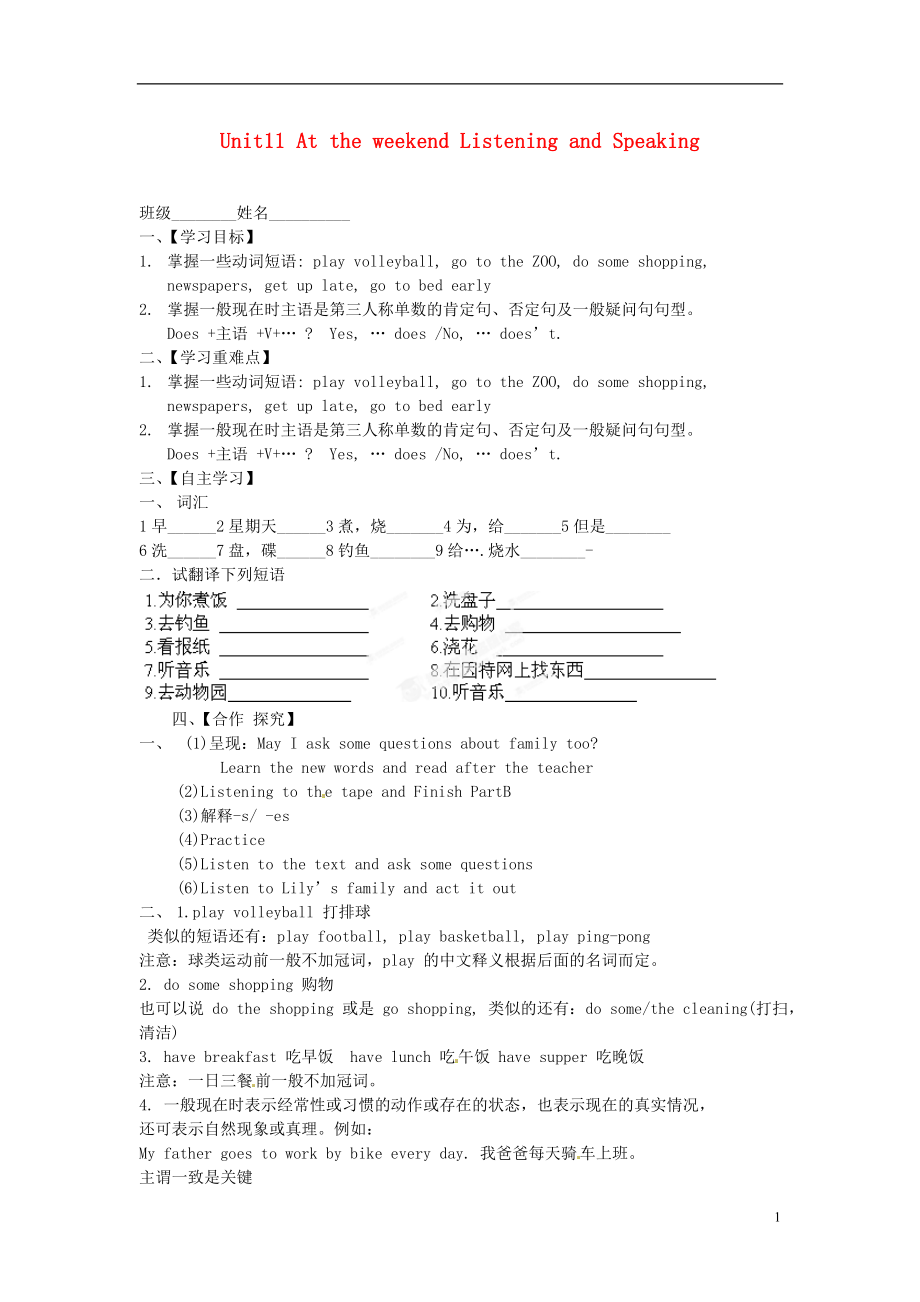《2021-2021學(xué)年七年級(jí)英語(yǔ)下冊(cè) Unit11 At the weekend Listening and Speaking導(dǎo)學(xué)案(無(wú)答案)》由會(huì)員分享���,可在線閱讀,更多相關(guān)《2021-2021學(xué)年七年級(jí)英語(yǔ)下冊(cè) Unit11 At the weekend Listening and Speaking導(dǎo)學(xué)案(無(wú)答案)(2頁(yè)珍藏版)》請(qǐng)?jiān)谘b配圖網(wǎng)上搜索����。
1�、
Unit11 At the weekend Listening and Speaking
班級(jí)________姓名__________
一���、【學(xué)習(xí)目標(biāo)】
1. 掌握一些動(dòng)詞短語(yǔ): play volleyball, go to the ZOO, do some shopping, newspapers, get up late, go to bed early
2. 掌握一般現(xiàn)在時(shí)主語(yǔ)是第三人稱單數(shù)的肯定句�����、否定句及一般疑問(wèn)句句型����。
Does +主語(yǔ) +V+… ? Yes, … does /No, … does’t.
二�����、【學(xué)習(xí)重難點(diǎn)】
1. 掌握一些動(dòng)詞短語(yǔ): play
2�、volleyball, go to the ZOO, do some shopping, newspapers, get up late, go to bed early
2. 掌握一般現(xiàn)在時(shí)主語(yǔ)是第三人稱單數(shù)的肯定句、否定句及一般疑問(wèn)句句型�。
Does +主語(yǔ) +V+… ? Yes, … does /No, … does’t.
三、【自主學(xué)習(xí)】
一�、 詞匯
1早______2星期天______3煮,燒_______4為����,給_______5但是________
6洗______7盤,碟______8釣魚________9給….燒水________-
二.試翻譯下列短語(yǔ)
四�、【
3���、合作 探究】
一�、 (1)呈現(xiàn):May I ask some questions about family too?
Learn the new words and read after the teacher
(2)Listening to the tape and Finish PartB
(3)解釋-s/ -es
(4)Practice
(5)Listen to the text and ask some questions
(6)Listen to Lily’s family and act it out
二、 1.play volleyball
4�����、 打排球
類似的短語(yǔ)還有:play football, play basketball, play ping-pong
注意:球類運(yùn)動(dòng)前一般不加冠詞�����,play 的中文釋義根據(jù)后面的名詞而定��。
2. do some shopping 購(gòu)物
也可以說(shuō) do the shopping 或是 go shopping, 類似的還有:do some/the cleaning(打掃���,清潔)
3. have breakfast 吃早飯 have lunch 吃午飯 have supper 吃晚飯
注意:一日三餐前一般不加冠詞�����。
4. 一般現(xiàn)在時(shí)表示經(jīng)常性或習(xí)慣的動(dòng)作或存在的狀態(tài)����,也表示現(xiàn)在的
5�����、真實(shí)情況,
還可表示自然現(xiàn)象或真理�����。例如:
My father goes to work by bike every day. 我爸爸每天騎車上班�。
主謂一致是關(guān)鍵
一般現(xiàn)在時(shí)構(gòu)成比較簡(jiǎn)單,重點(diǎn)在主謂一致上����,特別是動(dòng)詞第三人稱單數(shù)的變化形式。例:Mr Lee is our English teacher. He often plays basketball with US after school.
時(shí)間狀語(yǔ)記心間
一般現(xiàn)在時(shí)的時(shí)間狀語(yǔ)主要有:every day/ in the morning/ afternoon/ evening 等短語(yǔ)���,以及sometimes, often,
6�、usually, always, never 等頻度副詞��。
五�、【達(dá)標(biāo)鞏固】
一、 按要求作句型轉(zhuǎn)換�。
1. I often play football after school(對(duì)劃線部分提問(wèn))
_______ ______ you often _______ after school?
2. Kate does some cleaning on Sunday。(改成一般疑問(wèn)句并作肯定和否定回答)
_______ Kate ______ some cleaning on Sunday��?
Yes, she _______. No, she __________.
3. We
7�����、go to school on Sunday. (改為否定句)
We _________ _________ to school on Sunday.
4. My brother watches TV after supper. (對(duì)劃線部分提問(wèn))
________ ______ ________ brother ________ _____ after supper.
三、根據(jù)首字母或中文提示寫單詞
1. She enjoys c________(聊天) with her friends after supper.
2. She has lunch in a __________
8�����、___(飯店)
3. My father likes reading the ________(報(bào)紙) at lunch time.
4. Please c_______ the windows. They are not clean(干凈的)��。
5. Let go and ________(看望) my teacher this Sunday.
6. Does your mother cook at the w_________?
7. He ________(有時(shí)) goes home late.
8. I like watering the f________.
四�����、用所給單詞的正確形式填空
1. She _________(not do) housework in the afternoon.
2. Lily often goes _________(shop) with her mother.
3. _______ ________ in the classroom.
4. I help my mother ________(water) the flowers.
5. I want ____ _______ (tell) you about it.
2
 2021-2021學(xué)年七年級(jí)英語(yǔ)下冊(cè) Unit11 At the weekend Listening and Speaking導(dǎo)學(xué)案(無(wú)答案)
2021-2021學(xué)年七年級(jí)英語(yǔ)下冊(cè) Unit11 At the weekend Listening and Speaking導(dǎo)學(xué)案(無(wú)答案)

